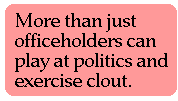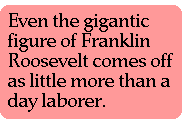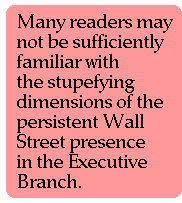"Will the real oligarchs please stand up," by
Nicholas Strakon, part four.
www.thornwalker.com/ditch/indispensable_04.htm
Reprint
rights
Our Walter Karp table
of contents
TOC for Strakon's article
Oligarchs or
creatures?
The two parties are indispensable enemies, but Karp
shows that the Democracy — the traditional ruling
party since 1933, despite some semi-interregnums
— also maintained a system of collusion between
false enemies within their party. Dummy liberals
under the thumb of Northern big-city bosses —
Karp calls them "Tammany liberals" —
masqueraded as intraparty opponents but actually
colluded systematically with the reactionary "Bourbons"
of the one-party South to protect the overall
organization against maverick populist
outsiders.
The Bourbons. Two prominent
Bourbons, in Karp's account, were Sen. Robert Kerr of
Oklahoma and Sen. Richard Russell of Georgia. Kerr "was
called the 'uncrowned king' of the Senate in 1962," Karp
writes, "despite being a domineering bully and one of the
most avaricious boodlers in Senate history." (p. 55)
Some readers of Karp might find it odd that the author
nowhere mentions that the "uncrowned king" from
Oklahoma was none other than Kerr of Kerr-McGee, the
big oil, chemical, and uranium producer. But in Karp's
scheme, an officeholder's "extra-regime" affiliations and
economic base are relatively trivial matters. Power
creates great wealth; great wealth does not capture
power.
Russell was "leader of the Senate Bourbons" and "wielded
enormous power until his death in 1971 regardless of
how many non-Bourbon Democrats held seats." (p. 55)
That last comment is significant. Karp shows that the
purportedly entrenched seniority system actually
depended on uninterrupted collusion because the Bourbons
were always outnumbered by non-Bourbons, often
massively so; and, moreover, that the purportedly
sacrosanct seniority rules were routinely violated
whenever it served oligarchical interests. Thus, Bourbon
Senators Russell, Richard C. Byrd of West Virginia, and
A. Willis Robertson of Virginia were awarded seats on
the key Appropriations Committee in their freshman
year, while the relative maverick Ralph Yarborough
of Texas was long excluded "even though he was the
senior Senator bidding for a seat." (p. 56) [3]
It gets worse. The Bourbon William Colmer,
representative from Mississippi, lost his seat on the
Rules Committee when the Republicans took over the
House in 1947, and  in 1948 he deserted the
Democrats to campaign for Dixiecrat presidential
candidate Strom Thurmond. Yet when the Democracy
resumed control in 1949, Speaker Sam Rayburn gave
Colmer's old seat on Rules back to him. In 1960, Colmer
"openly campaigned against John Kennedy" in the
presidential race, but "retained all his privileges" and
became Rules chairman in 1967. (p. 55)
in 1948 he deserted the
Democrats to campaign for Dixiecrat presidential
candidate Strom Thurmond. Yet when the Democracy
resumed control in 1949, Speaker Sam Rayburn gave
Colmer's old seat on Rules back to him. In 1960, Colmer
"openly campaigned against John Kennedy" in the
presidential race, but "retained all his privileges" and
became Rules chairman in 1967. (p. 55)
Note one thing. Kerr, Russell, Colmer, and the rest
possessed the exact same quantum of official state
power as their back-bench colleagues: one vote each, on
the floor or in committee. They wielded additional
power thanks to the collusion — that is, the
self-interested acquiescence — of most of their
colleagues, particularly the Tammany liberals. We see,
then, that Karp's whole structure of congressional
collusion is a matter of political clout, not formal
government per se. At the risk of stating the obvious, I
must point out that more than just officeholders can play
at politics and exercise clout.
The bosses. Most notorious among
Karp's big-city bosses who controlled the fake Democrat
liberals was Chicago's original Mayor Richard Daley. But
unlike Daley, many of the bosses held no positions with a
polity at any level, and that immediately gives rise to a
problem, under Karp's conception of power. The author
himself stipulates:
Party organizations ... have no binding
authority over their members; party bosses have no legal
power to command and party members no compulsion to
obey.... What renders party members submissive to
party oligarchs in the end is the expectation of reward
for loyalty and the fear of reprisal for independence. [4]
That even forces us to take a closer look at Daley. His
power as a strongman resided locally; on what, then, did
his clout in the national party rest? An urban boss, even
if he did hold actual, official power in Chicago, would
possess absolutely no "power to command" a Democrat in
Philadelphia. Daley possessed only the power to
bargain, by promising to deliver or threatening to
withhold the Chicago cemetery vote.
Karp's general thesis is that one must actually be a part
of the official state to wield power; but surely what
applies to "helpless" corporate titans must apply as well
to party bosses who either hold no office with the state
or hold only local office. How, then, can such local bosses
qualify as true national oligarchs when major Wall Street
figures cannot? This must lead us to suspect that, contra
Karp, extra-regime figures can, somehow, wield
the power of the regime.
Presidents and other wigs.
Confusingly, the mere holding of high office does not
necessarily convey true power in Karp's scheme.
Rayburn seems — in Karp's account — to
have been a true oligarch, but not Speaker John
McCormack. McCormack (D.-Mass.), who served as
majority leader before taking over from Rayburn as
speaker, was "a lifetime servant of the Democratic
machine," according to Karp. (p. 113) Only a servant?
Not the master of his domain? Not, at the very least, a
senior colleague in the congressional machine or the
Boston machine? In showing how McCormack sabotaged
John Kennedy's aid-to-education bill (which Karp
considers a reform measure), Karp writes: "If
McCormack were acting independently, it was the first
and last act of independence in a half century of
undeviating party servility." (p. 114) Acting collegially is
one thing; acting servilely is quite another.
The import of Karp's discussion of the education bill is
that Kennedy intended the measure only as a "show of
action" (in the old phrase favored by Tammany) and
underhandedly orchestrated its defeat in Congress. So it
seems that in Karp's view, Kennedy was senior to
McCormack in the party oligarchy. Personally, I cannot
take seriously the picture of little John Kennedy as a
senior oligarch. Elsewhere in his book, it seems that Karp
can't, either: as late as 1960, when Kennedy was running
for president, Karp portrays him as completely
dependent on — even a recent creature of —
the oligarchs, not a senior oligarch himself.
(pp. 73-74)
That brings us to the question of the status that Karp
accords presidents. Surprisingly, it is not clear in Karp
to what extent presidents qualify as true party
oligarchs, despite the fact that they hold what Karp
would surely agree is the world's most powerful official
post.
As depicted in Karp's chapter 7, "Johnson Launches a
War," Lyndon Johnson is a figure who made his own
decisions, disdainfully  ignored his advisors, and, generally, operated as an autocrat. But in the same
chapter, Karp also describes Johnson as a "faithful party
servant" and a "beneficiary and servant of the national
Democratic machine." (p. 156) Servant, not master or, at
least, senior colleague?
ignored his advisors, and, generally, operated as an autocrat. But in the same
chapter, Karp also describes Johnson as a "faithful party
servant" and a "beneficiary and servant of the national
Democratic machine." (p. 156) Servant, not master or, at
least, senior colleague?
Then there is the mention a few pages later of "the party
oligarchs who nominated Johnson in 1964, and whom he
had served so faithfully throughout his political career."
(p. 159) Even as late as 1964, Johnson still
depended on more-senior oligarchs?
In the last sentence of chapter 7, Karp comments on
Johnson's fate once the disastrous nature of the Vietnam
adventure became inescapable: "Since he had started the
war for the good of [the] party machine, he was
bowed out of politics in March 1968 in order to save
it again." (p. 160; emphasis added) Note the use of the
passive voice. Even if Johnson was an oligarch of some
rank, it appears his power was not truly
irresponsible.
I think Karp would agree with me that the idea of such
manikins as Jerry Ford, Jimmy Carter, and Willy Clinton
being  national oligarchs, "party" or otherwise, is nothing
less than risible. [5] But even the gigantic figure of
Franklin Roosevelt — whom I always enjoy
describing as "bond writer and international investor
Franklin Roosevelt" — comes off as little more than
a day laborer in Karp. After Roosevelt sabotaged the
reformers in Congress with his court-packing scheme,
Karp writes, "the party bosses repaid him well for his
sacrifice by letting him seek an unprecedented third term
and play a very satisfying role, that of a 'wartime
leader.'" (p. 141)
national oligarchs, "party" or otherwise, is nothing
less than risible. [5] But even the gigantic figure of
Franklin Roosevelt — whom I always enjoy
describing as "bond writer and international investor
Franklin Roosevelt" — comes off as little more than
a day laborer in Karp. After Roosevelt sabotaged the
reformers in Congress with his court-packing scheme,
Karp writes, "the party bosses repaid him well for his
sacrifice by letting him seek an unprecedented third term
and play a very satisfying role, that of a 'wartime
leader.'" (p. 141)
Karp's Bourbon/Tammany formulation satisfyingly
demolishes the high-school-civics account of how
congressional and party power structures traditionally
operated, at least when the Democrats were on top (as
they usually were). It is therefore invaluable from a
historical standpoint, regardless of the fact that, from
our perspective in the 1990s, it has long since been
overtaken by events. The problem, I think, lies in its
implications for presidents and other high officeholders
in the Executive Branch. If Democrat presidents were not
great Bourbon or Tammany figures (and typically they
were not), they come off as relatively secondary figures
in Karp's account.
As regards not only presidents but officeholders in
general, Karp's misunderstanding of power leads him to
miss which distinction is the crucial one, in my view, for
comprehending the true ruling class. What I would insist
on as most important is not a distinction between
Bourbons/Tammanys and non-Bourbons/Tammanys, but
rather a distinction between mere hacks and creatures,
on the one hand, and those with important extra-regime
power bases, on the other. The latter distinction, alas,
has not been overtaken by events.
***
One ruling-class analyst who, like Karp, ridicules the
conventional understanding  of the major parties is
Murray N. Rothbard. Unlike Karp, however, Rothbard
finds the shapers of state action outside the official
regime. In Banks, Wall Street, and American Foreign
Policy, he writes: "The name of the political party in
power is far less important than the particular regime's
financial and banking connections." [6]
of the major parties is
Murray N. Rothbard. Unlike Karp, however, Rothbard
finds the shapers of state action outside the official
regime. In Banks, Wall Street, and American Foreign
Policy, he writes: "The name of the political party in
power is far less important than the particular regime's
financial and banking connections." [6]
Many readers may not be sufficiently familiar with the
stupefying dimensions of the persistent Wall Street
presence in the Executive Branch. I refer the curious to
Rothbard's eye-opening work. His 62-page essay, written
in 1984, makes for an odd sort of reading because so
much of it consists of names, names, and more names
— hundreds of names — of big bankers, Wall
Street lawyers, Wall Street-connected corporate
figures, and Wall Street dependents from academe who
have infested the various regimes since the 1880s.
True, those men — insofar as they were Cabinet
members, sub-Cabinet officials, agency heads,
ambassadors, or presidential advisors — retained
their posts at the pleasure of the president. Karp would
insist that they were little more than "face men," spear
carriers, and order takers conscripted into the
presidential service. He does seem to concede that they
gave genuine advice to presidents, but makes clear his
conviction that presidents freely rejected or ignored that
advice whenever they saw fit.
However, if Karp's understanding of power wielding is
wrong — if the flow of power is reversed —
the picture changes completely. I will offer one anecdote,
courtesy of G. William Domhoff in The Powers That
Be. Under its weight, Karp's interpretative apparatus
may creak and groan a bit. [7]
After the little Lothario John Kennedy was elected, he
pressed Robert A. Lovett to accept nomination as
minister of foreign affairs, or finance, or war —
any of the top three Cabinet posts. Domhoff says Lovett
was "an unusual advisor for a President-elect who had
promised to get the country moving again." [8]
Why was that? In The Wise Men: Six Friends and the
World They Made, Walter Isaacson and Evan Thomas
list Lovett as one of the chief Establishmentarians of the
postwar period. [9] Rothbard notes that Lovett was a
partner at the investment house of Brown Brothers,
Harriman; a star of considerable magnitude in the old
Rockefeller power constellation; and a backer, in the
1960 presidential race, of — Richard Nixon!
(pp. 31, 40)
According to Domhoff, Kennedy told Lovett that he,
Kennedy, "had spent the last five years ... running for
office, and he did not know any real public officials,
people to run a government, serious men," and therefore
needed Lovett's help as a Cabinet minister. (p. 164)
Somehow — despite Karp's assumptions about
power — Lovett was able to decline that command
performance. But he did recommend three men: for the
foreign affairs portfolio, Dean Rusk of the
Rockefeller Foundation and the Council on Foreign
Relations; for the finance portfolio, C. Douglas
Dillon of the CFR and the investment house Dillon,
Read; and for the war portfolio, Robert
McNamara of the Ford Motor Company. Those names
may ring a bell with those old enough to remember the
Kennedy regime.
Lovett's participation in the personnel-selection process
seems to lend credence to Karp's general theory of
interparty collusion — the central insight of
Indispensable Enemies. But it would be absurd to
regard the mandarin Lovett as primarily a party
oligarch; and remarkably absent from the account of the
normally percipient Domhoff is any active role for party
oligarchs as such. That leads me to wonder: Who is
actually responsible for collusive rule? And: Who are the
real oligarchs?
To the
next part: "Warmongering"
Posted June 8, 2002
Posted in 2002 by WTM
Enterprises..
Notice to visitors who
came
straight to this document from off site: You are deep in
The Last Ditch. You should
check out our home page and table of
contents.
 in 1948 he deserted the
Democrats to campaign for Dixiecrat presidential
candidate Strom Thurmond. Yet when the Democracy
resumed control in 1949, Speaker Sam Rayburn gave
Colmer's old seat on Rules back to him. In 1960, Colmer
"openly campaigned against John Kennedy" in the
presidential race, but "retained all his privileges" and
became Rules chairman in 1967. (p. 55)
in 1948 he deserted the
Democrats to campaign for Dixiecrat presidential
candidate Strom Thurmond. Yet when the Democracy
resumed control in 1949, Speaker Sam Rayburn gave
Colmer's old seat on Rules back to him. In 1960, Colmer
"openly campaigned against John Kennedy" in the
presidential race, but "retained all his privileges" and
became Rules chairman in 1967. (p. 55) ignored his advisors, and, generally, operated as an autocrat. But in the same
chapter, Karp also describes Johnson as a "faithful party
servant" and a "beneficiary and servant of the national
Democratic machine." (p. 156) Servant, not master or, at
least, senior colleague?
ignored his advisors, and, generally, operated as an autocrat. But in the same
chapter, Karp also describes Johnson as a "faithful party
servant" and a "beneficiary and servant of the national
Democratic machine." (p. 156) Servant, not master or, at
least, senior colleague?
 of the major parties is
Murray N. Rothbard. Unlike Karp, however, Rothbard
finds the shapers of state action outside the official
regime. In Banks, Wall Street, and American Foreign
Policy, he writes: "The name of the political party in
power is far less important than the particular regime's
financial and banking connections."
of the major parties is
Murray N. Rothbard. Unlike Karp, however, Rothbard
finds the shapers of state action outside the official
regime. In Banks, Wall Street, and American Foreign
Policy, he writes: "The name of the political party in
power is far less important than the particular regime's
financial and banking connections."